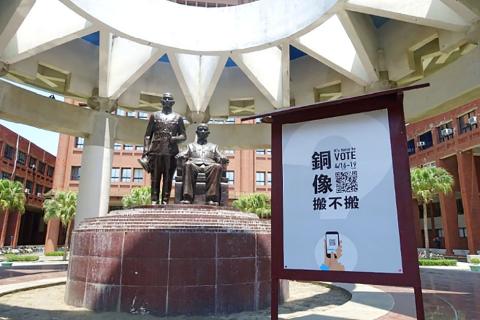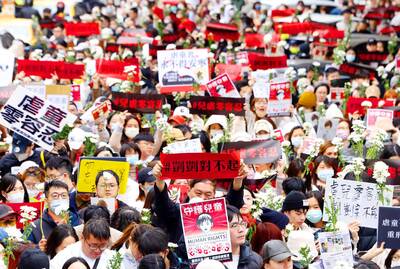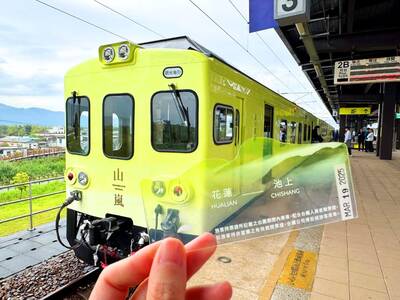Kaohsiung’s National Sun Yat-sen University (NSYSU) is to host a school-wide referendum tomorrow to decide whether to move the statues of Sun Yat-sen (孫中山) and Chiang Kai-shek (蔣介石) on its campus.
The referendum reflects Taiwan’s democratic education and is the first of its kind among the nation’s colleges and universities, NSYSU’s administration said in the announcement.
Under an atmosphere of rationality and mutual respect, the school can hopefully resolve an issue that has concerned its students and faculty for a long time, it added.

Photo: Huang Hsu-lei, Taipei Times
Student representatives on Oct. 21, 2016, at a university affairs meeting proposed removing the statues that stand outside the university’s Info-Library Building.
The administration at the end of that year formed an ad hoc committee and on Nov. 3 last year decided to host a school-wide referendum on the issue.
Online voting is to open at 9am tomorrow and close at 4pm on Thursday, the Office of Student Affairs said on Friday.
Students and faculty who were enrolled or employed as of Tuesday are eligible to vote in the referendum, as well as Chinese and other foreign students, the office added.
Participants may select one of three options: keep the statues where they are, move them to a different location on campus or move them off-campus, the office said.
A total of 10,862 people are eligible to vote and there is no minimum voter turnout requirement for the referendum to pass, it added.
The bronze statues are landmarks, an unnamed NSYSU professor said, asking if the university could retain its name if the statue of Sun is removed.
Others have proposed removing Chiang’s statue, but keeping the one of Sun, saying that the former is often vandalized while the latter is relatively uncontroversial.
A referendum is the best way to decide how campus space is used and how history should be perceived, NSYSU student association president Yuan Ho-ching (袁禾青) said, adding that no matter the result, it would be the collective decision of the entire school community.

Taiwan yesterday condemned the recent increase in Chinese coast guard-escorted fishing vessels operating illegally in waters around the Pratas Islands (Dongsha Islands, 東沙群島) in the South China Sea. Unusually large groupings of Chinese fishing vessels began to appear around the islands on Feb. 15, when at least six motherships and 29 smaller boats were sighted, the Coast Guard Administration (CGA) said in a news release. While CGA vessels were dispatched to expel the Chinese boats, Chinese coast guard ships trespassed into Taiwan’s restricted waters and unsuccessfully attempted to interfere, the CGA said. Due to the provocation, the CGA initiated an operation to increase

A crowd of over 200 people gathered outside the Taipei District Court as two sisters indicted for abusing a 1-year-old boy to death attended a preliminary hearing in the case yesterday afternoon. The crowd held up signs and chanted slogans calling for aggravated penalties in child abuse cases and asking for no bail and “capital punishment.” They also held white flowers in memory of the boy, nicknamed Kai Kai (剴剴), who was allegedly tortured to death by the sisters in December 2023. The boy died four months after being placed in full-time foster care with the

CHANGING LANDSCAPE: Many of the part-time programs for educators were no longer needed, as many teachers obtain a graduate degree before joining the workforce, experts said Taiwanese universities this year canceled 86 programs, Ministry of Education data showed, with educators attributing the closures to the nation’s low birthrate as well as shifting trends. Fifty-three of the shuttered programs were part-time postgraduate degree programs, about 62 percent of the total, the most in the past five years, the data showed. National Taiwan Normal University (NTNU) discontinued the most part-time master’s programs, at 16: chemistry, life science, earth science, physics, fine arts, music, special education, health promotion and health education, educational psychology and counseling, education, design, Chinese as a second language, library and information sciences, mechatronics engineering, history, physical education

The Shanlan Express (山嵐號), or “Mountain Mist Express,” is scheduled to launch on April 19 as part of the centennial celebration of the inauguration of the Taitung Line. The tourism express train was renovated from the Taiwan Railway Corp’s EMU500 commuter trains. It has four carriages and a seating capacity of 60 passengers. Lion Travel is arranging railway tours for the express service. Several news outlets were invited to experience the pilot tour on the new express train service, which is to operate between Hualien Railway Station and Chihshang (池上) Railway Station in Taitung County. It would also be the first tourism service